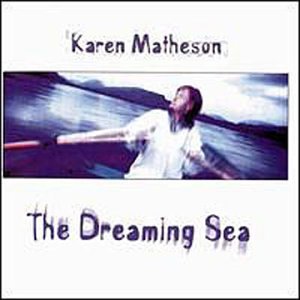 One of Scotland’s more endearing — and enduring — bands, Capercaillie (named, curiously, for a particularly large species of Scottish grouse) has been making beautiful music for nearly twenty years now. Formed in 1984 by Donald Shaw, Karen Matheson and Marc Duff, Capercaillie has seen a few line-up changes, and some adventuresome musical wanderings (club remixes and world music!), yet has remained true to its Scottish roots. Capercaillie’s work has been heard not only on the radio, but in the movie Rob Roy, and in a host of BBC television series. Their 1998 compilation CD, Dusk Till Dawn, and vocalist Karen Matheson’s 1996 solo effort, The Dreaming Sea, are the perfect introduction to the band’s sound and history.
One of Scotland’s more endearing — and enduring — bands, Capercaillie (named, curiously, for a particularly large species of Scottish grouse) has been making beautiful music for nearly twenty years now. Formed in 1984 by Donald Shaw, Karen Matheson and Marc Duff, Capercaillie has seen a few line-up changes, and some adventuresome musical wanderings (club remixes and world music!), yet has remained true to its Scottish roots. Capercaillie’s work has been heard not only on the radio, but in the movie Rob Roy, and in a host of BBC television series. Their 1998 compilation CD, Dusk Till Dawn, and vocalist Karen Matheson’s 1996 solo effort, The Dreaming Sea, are the perfect introduction to the band’s sound and history.
The tracks on Dusk Till Dawn are drawn from six of Capercaillie’s CDs, spanning the years from 1991 to 1997. They have also added a bonus song, “Breislach,” recorded live in 1993. On eight of the seventeen tracks, the band demonstrates its deep love of Scottish music, putting its own spin on traditional arrangements. Included are the haunting “Ailein Duinn / Dark Alan,” probably better known as the theme song from Rob Roy, and “Coisich a Ruin,” the first top 40 Gaelic single (according to their Web site). The remaining tracks were contributions by past and present members of the band (Donald Shaw, Manus Lunny, and John Saich).
 The members of Capercaillie are equally at ease with both traditional and modern arrangements, and Karen Matheson’s exquisite vocals shine in both English and Scottish Gaelic. Their creative approach varies from song to song, making music that could spring easily from the foggy lowlands (“Ailein Duinn,” “Coisich a Ruin,” “The Whinney Hills Jigs” and “Dr. MacPhail’s Reel”) alongside radio-friendly songs (“Miracle of Being,” “Waiting for the Wheel to Turn,” “Inexile” and “Grace and “Pride”). These latter are especially notable for their blend of modern pop sensibility with Gaelic underpinnings. Not content with simply merging traditional and pop, Capercaillie stretches the horizons of the musical genre further on “Miracle of Being,” by teaming with Soul ll Soul producer Will Mowat to produce a club remix radio single, and on “Inexile,” by inviting New Guinea singers Paloma Loriba and Pirucho Apo along for a foray into world music. “Waiting for the Wheel to Turn” combines Shaw’s politically charged lyrics with Matheson’s soaring vocals to produce a heartfelt Scottish anthem.
The members of Capercaillie are equally at ease with both traditional and modern arrangements, and Karen Matheson’s exquisite vocals shine in both English and Scottish Gaelic. Their creative approach varies from song to song, making music that could spring easily from the foggy lowlands (“Ailein Duinn,” “Coisich a Ruin,” “The Whinney Hills Jigs” and “Dr. MacPhail’s Reel”) alongside radio-friendly songs (“Miracle of Being,” “Waiting for the Wheel to Turn,” “Inexile” and “Grace and “Pride”). These latter are especially notable for their blend of modern pop sensibility with Gaelic underpinnings. Not content with simply merging traditional and pop, Capercaillie stretches the horizons of the musical genre further on “Miracle of Being,” by teaming with Soul ll Soul producer Will Mowat to produce a club remix radio single, and on “Inexile,” by inviting New Guinea singers Paloma Loriba and Pirucho Apo along for a foray into world music. “Waiting for the Wheel to Turn” combines Shaw’s politically charged lyrics with Matheson’s soaring vocals to produce a heartfelt Scottish anthem.
Karen Matheson’s solo CD, The Dreaming Sea, which predates her band’s collection by two years, similarly displays traditional music deftly adapted to modern times, and is a perfect showcase for her amazing voice. Released in the hiatus between band projects, The Dreaming Sea is, much as its title suggests, a gentle, sweet pop lullaby. Matheson received song writing and arranging help on most of the thirteen tracks from band mate Donald Shaw and from James Grant of the Scottish band Love and Money. She sings six of the tracks in Gaelic, once again demonstrating her superb singing ability in both languages. The instrumentation on all the songs is delicate, sparing and subdued, allowing Matheson’s vocals to shape and carry each. Which it does, beautifully. “There’s Always Sunday,” “The Dreaming Sea,” and “Evangeline” shine in particular among the original songs, alongside her excellent cover of Sandy Denny’s “One More Chance.”
Capercaillie is a very significant band not only to Scotland, but to Celtic music as a whole, and will hopefully continue to push musical boundaries for years to come. Dusk Till Dawn is an excellent retrospective CD, well-balanced between CDs and styles, and The Dreaming Sea shows off one of the finest voices in Celtic music. Just a taste of their music, as both these CDs offer, will surely whet anyone’s appetite for more.
(Survival Records, 1998)
(Survival Records, 1996)
